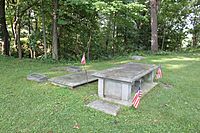Byron M. Cutcheon facts for kids
Quick facts for kids
Byron M. Cutcheon
|
|
|---|---|
 |
|
| Member of the U.S. House of Representatives from Michigan's 9th district |
|
| In office March 4, 1883 – March 3, 1891 |
|
| Preceded by | Jay A. Hubbell |
| Succeeded by | Harrison H. Wheeler |
| Personal details | |
| Born | May 11, 1836 Pembroke, New Hampshire, US |
| Died | April 12, 1908 (aged 71) Ypsilanti, Michigan, US |
| Political party | Republican |
| Spouse | Marie Amnie Warner |
| Alma mater | University of Michigan |
| Awards | Medal of Honor |
| Military service | |
| Allegiance | United States |
| Years of service | 1862–1865 |
| Rank | |
| Commands | |
| Battles/wars | American Civil War |
Byron Mac Cutcheon (born May 11, 1836 – died April 12, 1908) was an important person from Michigan. He was an officer in the American Civil War, a Medal of Honor winner, and a politician who served in the U.S. government.
Contents
Byron Mac Cutcheon's Early Life
Byron Mac Cutcheon was born in Pembroke, New Hampshire, on May 11, 1836. Sadly, his parents passed away when he was young, and he became an orphan. To earn money for school, he worked in a cotton mill. At age 13, he started attending Pembroke Academy. By 17, he was teaching at the same school!
In 1855, he moved to Ypsilanti, Michigan, where he kept studying and teaching. He even became the principal of Birmingham Academy in Oakland County, Michigan. He wanted to earn enough money to continue his own education. In 1858, he entered the University of Michigan. He also worked as a principal at Oak Grove Academy to support himself. He graduated from the University of Michigan in 1861. Before graduating, he was already a professor at Ypsilanti High School, teaching languages and philosophy.
Serving in the Civil War
Joining the Army
When the American Civil War began, Byron Mac Cutcheon left his teaching job to join the Union Army. He helped create a company for the Twentieth Regiment, Michigan Infantry. He started as a Second Lieutenant. He quickly rose through the ranks, becoming a captain on July 29, 1862, and a major on October 14, 1862. By November 1863, he was a lieutenant colonel, and then a colonel just a few days later.
In November 1864, he became the Colonel of the Twenty-seventh Michigan Infantry. He was recognized for his brave actions at the battles of the Wilderness and Spottsylvania Court House. This special recognition was called a "brevet" promotion, meaning it was an honorary rank for bravery.
Brave Actions and Battles
During the Civil War, Colonel Cutcheon fought in many important battles. These included Fredericksburg, Vicksburg, and the siege of Knoxville. He was also at the Battle of the Wilderness in Virginia on May 7, 1864. His actions there were so brave that he later received the Medal of Honor.
At the Battle of Spotsylvania Court House, he was wounded while leading his troops. He spent about two months recovering in the hospital. For his courage, he received another brevet promotion, this time to colonel. He also fought in the siege of Petersburg and other battles in Virginia.
In October 1864, he was given command of a brigade, which is a large group of soldiers. He led this brigade until March 1865, when he had to resign because of sickness in his family. On March 13, 1865, he was given the honorary rank of brigadier general for his outstanding bravery in battle.
Life After the War
Becoming a Lawyer and Public Servant
After the war, Byron Mac Cutcheon returned home. He studied law with his brother, Sullivan M. Cutcheon, in Ypsilanti. His brother was a well-known politician in Michigan. Byron then attended the University of Michigan Law School and became a lawyer in 1866.
He worked to help soldiers who had fought in the war. He traveled around Michigan, asking people to support the Michigan Soldiers' Monumental Association. This group helped build monuments to honor soldiers. He also served on the State Board of Railroad Commissioners from 1867 to 1883. In 1868, he was a Presidential elector for Michigan, helping to elect Ulysses S. Grant as president.
He was elected to the Board of Regents of the University of Michigan in 1875, helping to guide the university until 1883. He also served as the city attorney for Manistee and the prosecuting attorney for Manistee County, Michigan. From 1877 to 1883, he was the postmaster of Manistee.
Serving in Congress
In 1882, Byron Mac Cutcheon was elected as a Republican to the United States Congress. He represented Michigan's 9th congressional district. He was re-elected three more times, serving in Congress from March 4, 1883, to March 3, 1891.
While in Congress, he was the chairman of the Committee on Military Affairs. This meant he helped make decisions about the military. In 1890, he lost his re-election bid to Harrison H. Wheeler.
Family and Final Years
Byron Mac Cutcheon married Marie A. Warner in Dexter, Michigan, on June 22, 1863. They had five children together: four sons named Frank, Charles, Max, and Frederick, and one daughter named Marie Louise.
On June 29, 1891, he was officially awarded the Medal of Honor for his amazing bravery at the Battle of the Wilderness. After his time in Congress, he was appointed to the Board of Ordnance and Fortifications by U.S. President Benjamin Harrison. He also worked as an editorial writer for newspapers like the Detroit Daily Tribune.
Later, he returned to practicing law in Grand Rapids, Michigan. Byron Mac Cutcheon passed away in Ypsilanti on April 12, 1908. He is buried in Highland Cemetery.


